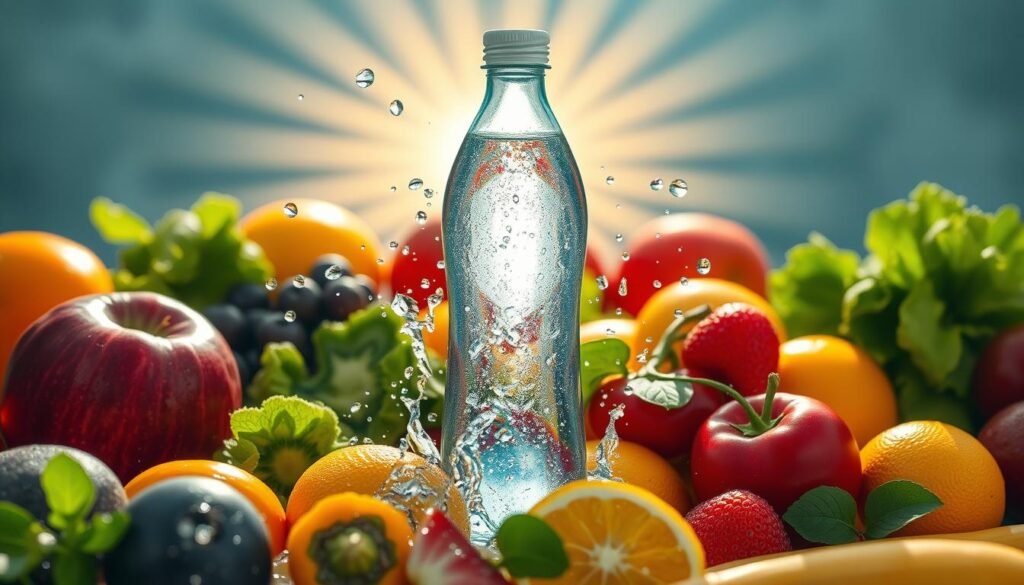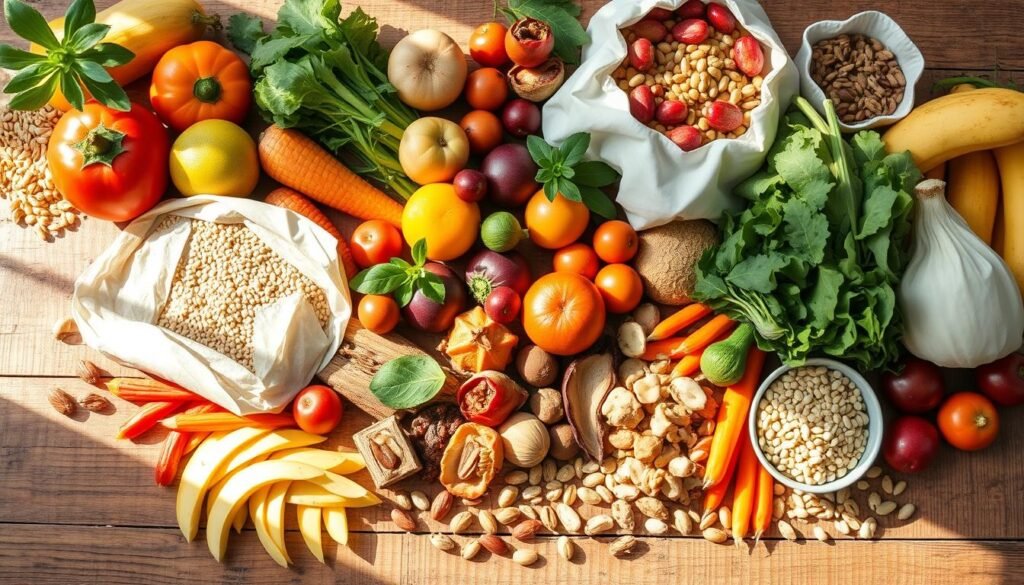Did you know that about 76% of Americans have felt really tired at some point? This shows how many people need better ways to stay energized. In our busy world, we really need to focus on getting enough sleep, drinking enough water, and eating right to feel our best. Not resting enough, not drinking enough water, and eating poorly can make us feel tired and less healthy. This article will give you helpful wellness tips to fight tiredness. With these tips, you can discover how to feel more energetic every day.
Key Takeaways
- Aim to eat every three to four hours, including three small-to-moderate-sized meals and two snacks.
- The recommended daily water intake is at least 6 to 8 cups, higher for those who exercise.
- Iron deficiency can lead to feelings of fatigue; include sources like spinach and red meat in your diet.
- Eating a diet rich in fruits and vegetables helps meet the CDC’s guideline of five portions daily.
- Focus on consuming complex carbohydrates and proteins for sustained energy throughout the day.
The Importance of Rest for Enhanced Energy
Getting good rest boosts your energy all day. It helps your mind, mood, and how well your body works. If you don’t sleep well, you’ll be tired and not do well in your daily tasks. About 60% of top athletes and 30% of other sports players suffer when they train too much without rest.
Adults need about eight hours of sleep each night. Kids between 6-12 years old need 9-12 hours, and teens should get 8-10 hours. Even pro athletes struggle to get enough sleep. Taking long to fall asleep and not feeling rested are common issues. This bad sleep raises cortisol, making it hard to manage tiredness and stay well.
To sleep better, try going to bed at the same time, reduce blue light before bed, and maybe meditate. Even missing a little sleep can weaken your immune system. But, taking a short 30-minute nap after lunch can make you run faster and feel more awake. Small steps like these help meet your body’s need for rest and energy.
Making sleep a priority and following good health tips every day can really boost your energy. This is key for better work and life success. Knowing how important rest is benefits everyone, not just athletes. It’s all about living a healthier life.
Rest, Hydration, and Nutrition for Better Energy Levels
Achieving top performance needs a mix of rest, hydration, and good food. Sleeping well boosts your energy since good sleep makes you feel more awake. Having a steady sleep schedule improves health a lot. Going to bed and getting up at the same time every day helps sleep better. This makes you feel more refreshed in the morning.
The Role of Sleep Quality
Sleep quality affects your energy and how well you think. Not sleeping enough can make you tired, less productive, and distracted. Doing things that help you sleep better, like turning off screens before bed, can make sleep more refreshing. A quiet, dark room also helps get uninterrupted sleep.
Establishing a Consistent Sleep Schedule
Keeping the same sleep schedule helps your body’s clock and improves sleep. Experts say it’s good to go to bed and wake up at the same time, even on weekends. This helps your energy stay up all day. Having a calm bedtime routine also helps.

| Sleep Hygiene Practices | Benefits |
|---|---|
| Reduce screen time before bed | Improves melatonin production, leading to better sleep quality |
| Create a calming bedtime routine | Signals to the body that it is time to unwind, aiding in faster sleep onset |
| Maintain a consistent sleep schedule | Enhances energy levels and cognitive function |
| Ensure a dark and quiet sleeping environment | Minimizes disruptions and promotes deeper sleep |
How Hydration Affects Energy Levels
Drinking enough water is key for staying full of energy all day. It helps with metabolism, moving nutrients, and keeping cool. Without enough water, our body can’t work well, and we feel tired. Knowing when you’re signs of dehydration thirsty helps you drink enough. This keeps your body balanced.
Understanding the Signs of Dehydration
Sometimes, people miss the early signs of not drinking enough water. Yet, these signs greatly impact how energetic you feel. Common signs of dehydration include:
- Fatigue
- Dizziness
- Dry mouth
- Dark-colored urine
- Headaches
- Reduced skin elasticity
Even losing a little bit of your body’s water can make you feel less sharp and more tired. Men should drink about 15.5 cups and women need around 11.5 cups a day, as recommended by top experts. But, almost half of Americans don’t drink enough water each day.
Drinking plenty of water helps you stay focused, active, and healthy. Good hydration does more than just keep you energetic. It’s crucial for many parts of your health. To learn more about how water affects your mind, check out this informative source.

| Daily Water Intake (cups) | Men | Women |
|---|---|---|
| Recommended | 15.5 | 11.5 |
| Percentage of Americans under intake | 47% | |
Nutritional Factors That Boost Energy
A good diet is key to keeping your energy up. Eating balanced diet full of whole foods helps manage energy and reduces tiredness. Foods in their natural state offer more nutrients, unlike processed foods that can slow you down.
Whole Foods vs. Processed Foods
Eating whole foods instead of processed foods brings many advantages. Natural foods like fruits, veggies, grains, and lean meats boost your energy. Processed foods, on the other hand, often include extra sugar and bad fats, leading to energy drops.
- Whole Foods: Packed with nutrients, offering vitamins, minerals, and fiber.
- Processed Foods: High in sugars and unhealthy fats, missing key nutrients.
| Aspect | Whole Foods | Processed Foods |
|---|---|---|
| Nutrient Density | High | Low |
| Added Sugars | None/Minimal | Often High |
| Fiber Content | High | Low |
| Energy Levels | Sustained | Variable |
The Power of Small, Balanced Meals
Small, well-portioned meals keep your energy stable. Aim to mix complex carbs, proteins, and fats in each meal. This keeps your blood sugar even, which maintains your energy.
- Include complex carbohydrates like brown rice or quinoa.
- Select lean proteins such as chicken, turkey, or legumes.
- Incorporate healthy fats from sources like avocados or nuts.
Choosing smartly not only boosts your energy but also helps your overall health. Pick whole foods and balanced meals for a day full of energy and productivity.

Key Nutrients for Sustained Energy
Knowing about key nutrients is vital for keeping your energy up all day. Eating foods rich in complex carbohydrates and protein boosts endurance and energy. A diet full of varied, nutrient-dense foods is good for health and performance.
Complex Carbohydrates for Endurance
Complex carbs are the body’s main energy source. Foods like oats, whole grains, and sweet potatoes keep your blood sugar steady. They give you a long-lasting energy boost.
- Steady energy release
- Improved endurance during workouts
- Feeling fuller longer, which helps with weight control
| Food Item | Type of Carbohydrate | Energy Contribution |
|---|---|---|
| Oats | Complex | High |
| Whole Grains | Complex | Moderate |
| Sweet Potatoes | Complex | High |
Protein’s Role in Energy Management
Protein is key for lasting energy. It helps release energy slowly and keeps you full longer. Eating foods like beans, dairy, and fatty fish helps because they:
- Keep blood sugar stable, avoiding energy dips
- Aid in muscle repair and growth
- Improve how our body works
To keep energy steady, focus on carbs and protein. Mixing these in your diet enhances stamina and leads to healthier living.
Hydration Strategies to Enhance Performance
Staying well-hydrated is key for athletes looking to boost their performance. Good hydration helps prevent dehydration, keeps energy high and supports health. Knowing how much water to drink daily helps people do their best during physical activity.
Daily Water Intake Recommendations
It’s important to drink enough water, considering your age, how active you are, and the weather. You might lose up to 2 quarts of fluid per hour when active. More intense activities could mean losing up to 3 quarts every hour. Knowing how much water you need is crucial.
Keep an eye on your thirst and the color of your urine to check if you’re hydrated. It’s better to drink water throughout the day instead of waiting to get thirsty. Dehydration can cause muscle cramps, tiredness, and dizziness. These signs show why staying hydrated is essential for doing well in sports.
Before starting any physical activity, adults should drink about 24 ounces of a sports drink or water with electrolytes. This should be done around two hours before they start. Drinking sports drinks with electrolytes during long workouts is better than plain water. They help keep your body’s electrolytes in balance. The advice is to drink 6 to 12 ounces every 20 minutes while you are active.
It’s very important to rehydrate after working out. You should drink 16 to 24 ounces of water or a sports drink made for recovery. Athletes need to drink 24 ounces for every pound they lose while exercising. Chocolate milk is also a great choice for helping your body recover after exercise.
| Hydration Guidelines | Adults | Teens | Kids |
|---|---|---|---|
| Pre-activity Drink | 24 oz Sports Drink | 24 oz Sports Drink | 16 oz Sports Drink |
| During Activity | 6-12 oz every 20 min | 11-16 oz every 20 min | 3-8 oz every 20 min |
| Post-activity Drink | 16-24 oz Water or Hypotonic Drink | 16 oz Water or Hypotonic Drink | 8 oz Water or Hypotonic Drink |
Be careful with sports drinks that are high in sugar. Drinking too much can lead to obesity, especially in kids or less active people. To perform at your best and avoid dehydration, make sure your hydration strategy is effective.
For more details on eating right and staying hydrated, visit this resource.
Incorporating Energy-Boosting Snacks
Eating small snacks helps keep your energy up all day. Adding different kinds of snacks that boost energy is good for you. Here are some ideas and info on why it’s key to snack at the right times. This helps keep your blood sugar balanced and stops you from feeling tired.
Examples of Nutritious Snacks
- Greek Yogurt with Berries: Full of protein and antioxidants, it keeps your energy up and gives you vital nutrients.
- Almonds: They are loaded with good fats and fiber. This helps keep your blood sugar steady for a fast energy lift.
- Bananas: They have natural sugars and potassium for a speedy energy boost, great before working out.
- Quinoa Salad: Packed with protein and fiber, quinoa keeps your energy steady. It’s also easy to make.
- Sweet Potatoes: A top source of complex carbs, sweet potatoes have lots of fiber for lasting energy.
The Impact of Snack Timing on Energy Levels
Eating snacks or meals every 3 to 4 hours is key for steady energy. It helps keep blood sugar level. This means you get the most out of your nutrients and it’s good for your gut. Having snacks that boost energy at regular times helps fight off tiredness and keeps you going.
| Snack Type | Protein (g) | Fiber (g) | Benefits |
|---|---|---|---|
| Greek Yogurt | 10 | 0 | High in protein, aids muscle recovery |
| Almonds | 6 | 3.5 | Helps in feeling fuller, stabilizes blood sugar |
| Banana | 1.3 | 3.1 | Quick energy source, rich in potassium |
| Quinoa Salad | 8 | 5 | High in protein, maintains steady energy |
| Sweet Potato | 2 | 4 | Rich in fiber and complex carbs |
Conclusion
Boosting energy isn’t just about quick fixes. It’s about a full approach that includes sleep, water, and food. Good sleep, enough water, and nutritious meals are key. They help raise energy levels a lot.
Adding tips for more energy into daily life helps too. Eating the right amounts of carbs and protein boosts athletic ability and energy. Keeping an eye on how much water you drink makes sure your body works its best. Using science-based advice helps create habits that fight tiredness and keep energy up.
Making smart choices about rest, drinking water, and eating well opens the door to better performance and health. Taking care of your health in all ways gives people long-lasting energy. This makes life more active and fun, no matter what you’re doing. For deeper info on water and health, check out hydration and wellness. Also, look at ways to fight tiredness with food and rest at wellness articles.